The Intel Xeon W Review: W-2195, W-2155, W-2123, W-2104 and W-2102 Tested
by Ian Cutress & Joe Shields on July 30, 2018 1:00 PM EST- Posted in
- CPUs
- Intel
- Xeon
- Workstation
- ECC
- Skylake-SP
- Skylake-X
- Xeon-W
- Xeon Scalable
Benchmarking Performance: CPU Office Tests
The office programs we use for benchmarking aren't specific programs per-se, but industry standard tests that hold weight with professionals. The goal of these tests is to use an array of software and techniques that a typical office user might encounter, such as video conferencing, document editing, architectural modelling, and so on and so forth.
All of our benchmark results can also be found in our benchmark engine, Bench.
Chromium Compile (v56)
Our new compilation test uses Windows 10 Pro, VS Community 2015.3 with the Win10 SDK to combile a nightly build of Chromium. We've fixed the test for a build in late March 2017, and we run a fresh full compile in our test. Compilation is the typical example given of a variable threaded workload - some of the compile and linking is linear, whereas other parts are multithreaded.
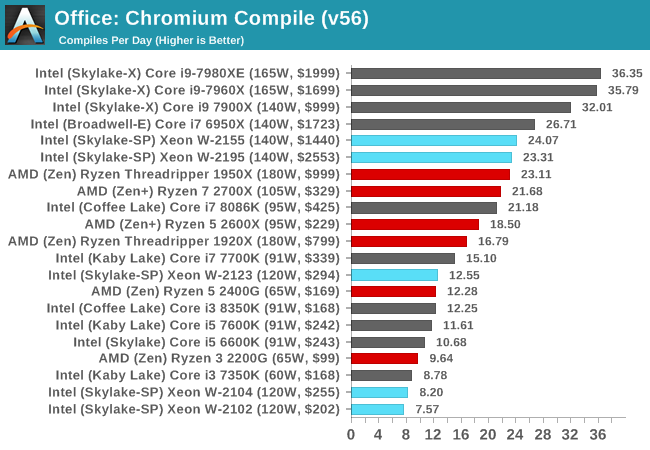
Our popular Chrome Compile test gives a good showing for the Intel CPUs, however the higher-powered Core i9 processors perform a lot better here - up to 50% in fact. Part of this is down to memory; the DDR4-2666 C19 memory is slower than the DDR4-2666 C16 used in our Core i9 reviews. However, there might also be a case for power draw - the BIOS defaults for the Core i9 processors allow for a lot more power consumption, which the Xeon W processors might not be able to tap in to. It is worth noting that the W-2155 wins against the W-2195, showing that in this test frequency matters as much as cores.
SYSmark 2014 SE: link
SYSmark is developed by Bapco, a consortium of industry CPU companies. The goal of SYSmark is to take stripped down versions of popular software, such as Photoshop and Onenote, and measure how long it takes to process certain tasks within that software. The end result is a score for each of the three segments (Office, Media, Data) as well as an overall score. Here a reference system (Core i3-6100, 4GB DDR3, 256GB SSD, Integrated HD 530 graphics) is used to provide a baseline score of 1000 in each test.
A note on context for these numbers. AMD left Bapco in the last two years, due to differences of opinion on how the benchmarking suites were chosen and AMD believed the tests are angled towards Intel processors and had optimizations to show bigger differences than what AMD felt was present. The following benchmarks are provided as data, but the conflict of opinion between the two companies on the validity of the benchmark is provided as context for the following numbers.
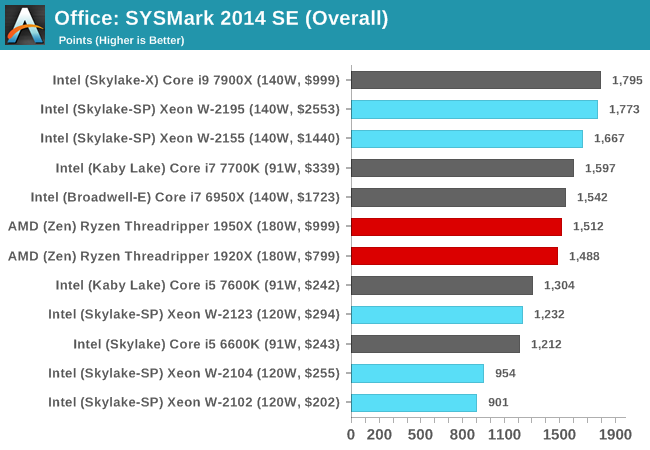
PCMark 10: link
PCMark 10 is the latest all-in-one office-related performance tool that combines a number of tests for low-to-mid office workloads, including some gaming, but focusing on aspects like document manipulation, response, and video conferencing.
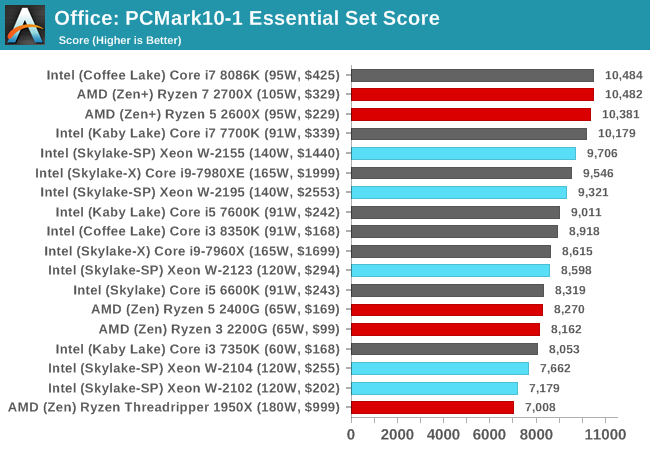
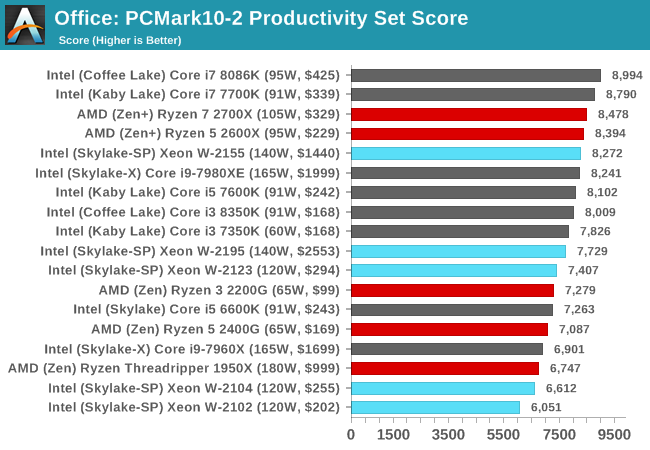
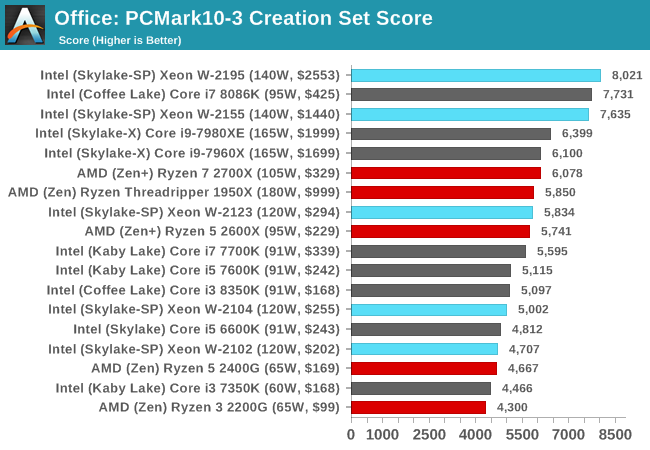
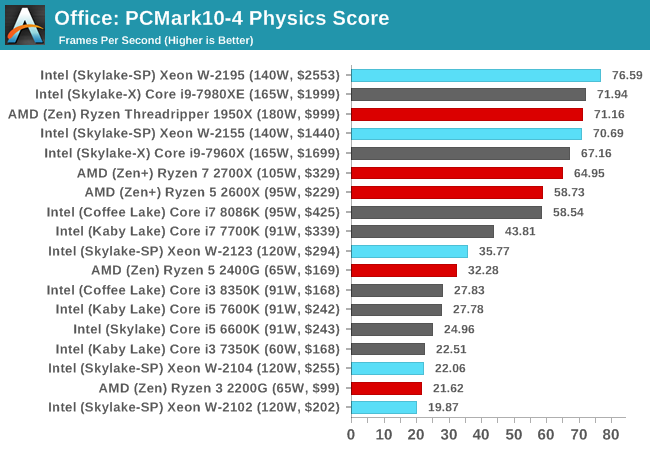
In the Physics score, the W-2195 takes a commanding lead, however the W-2155 is not far behind, offering a better performance per dollar metric. Both are outclassed by the Threadripper 1950X in this test, however. In fact, the only test where Xeon W truly wins is in the Creation test.
GeekBench4: link
GB4 is a popular tool in benchmarking, with most users liking its cross-platform functionality. Due to requests, we are including the data in our reviews. Our benchmark database has a more detailed breakdown of the sub-sections in the test.
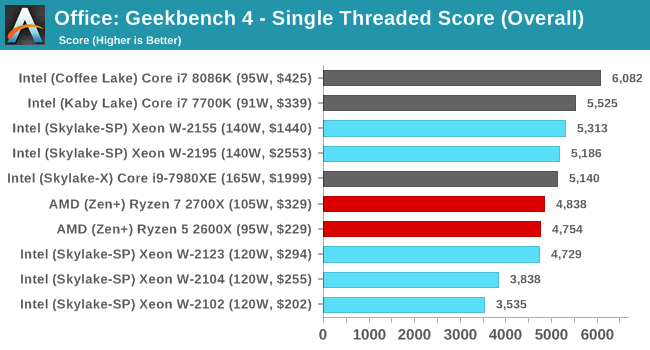
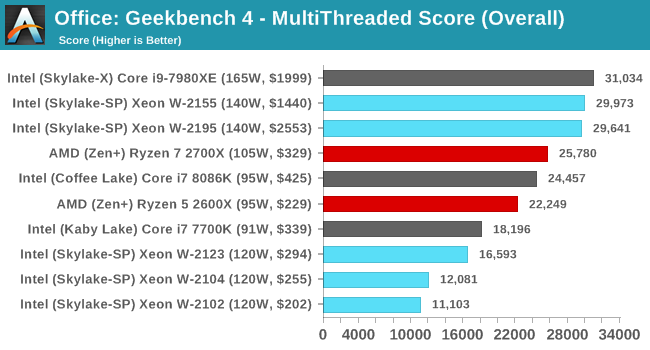
GeekBench 4 is still a newer benchmark in our test suite, hence the lack of comparative results.
PCMark8: link
Despite originally coming out in 2008/2009, Futuremark has maintained PCMark8 to remain relevant in 2017. On the scale of complicated tasks, PCMark focuses more on the low-to-mid range of professional workloads, making it a good indicator for what people consider 'office' work. We run the benchmark from the commandline in 'conventional' mode, meaning C++ over OpenCL, to remove the graphics card from the equation and focus purely on the CPU. PCMark8 offers Home, Work and Creative workloads, with some software tests shared and others unique to each benchmark set.
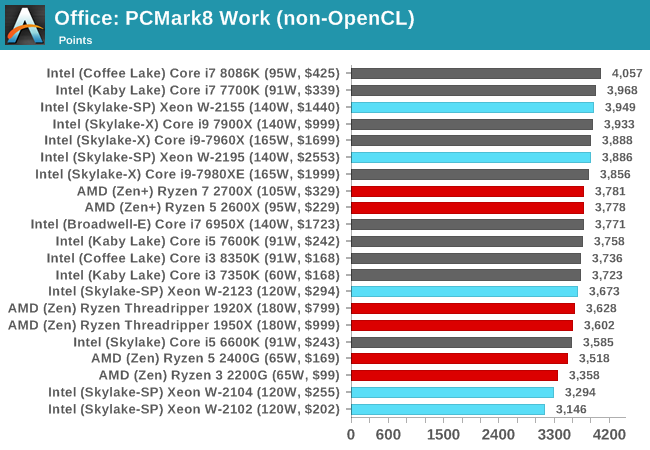
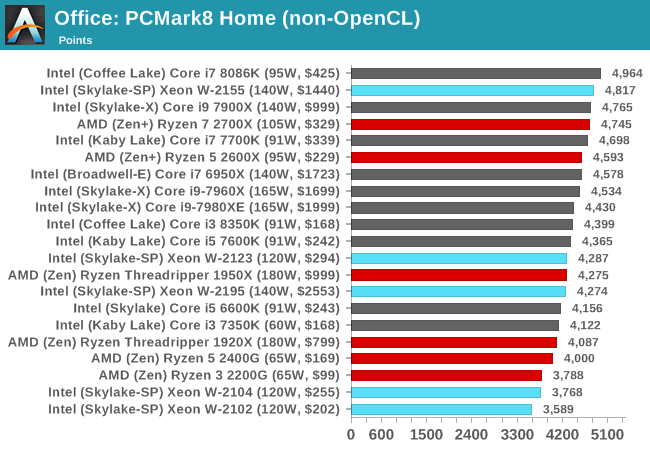
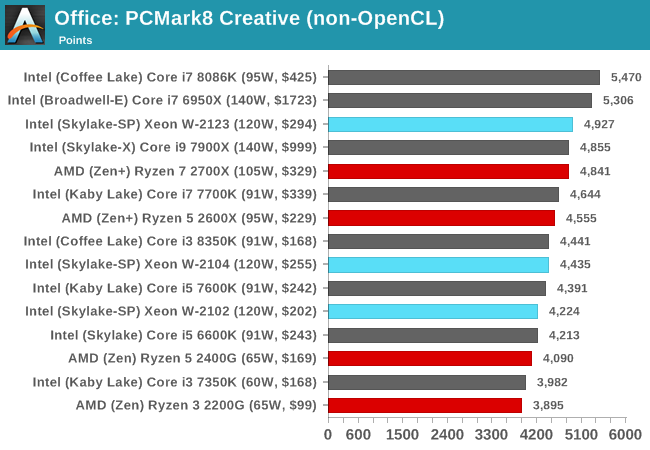
[words]










74 Comments
View All Comments
0ldman79 - Tuesday, July 31, 2018 - link
He was an Intel fanboy undercover as an AMD shill who's in Intel's pocket.He's a triple agent.
The only way to keep is cover is to not show bias, be objective and report the facts as they stand, otherwise his employers will figure out he's turned (and turned and turned) and they'll cut him loose.
True story.
BambiBoom - Monday, July 30, 2018 - link
Anandateers,As a Xeon / workstation user for many years, this is an interesting review, but seems eccentric to typical workstation buyers' tendencies.
There are three kinds of Xeon users based on the emphasis in applications: one, single thread performance such as 3D modeling, animation, and simulation, two, multi-threaded which includes CPU rendering, some well-threaded simulation, some aspects of video and photo-editing, and database, computational application, and three, a very common one in which the workstation has to be reasonably good at both single-threaded and multi-threaded. Solidworks is very useful to evaluate workstations as it's well-written and also demanding of both very high single and multi-thread performance. If you look at worsktation listings, the modeling units are i7-8800K A lot of Solidworks modelers are running i7-8800K systems- with the required Quadro. ECC is not as universal as it was five years ago. But, if the system is also used for the very well-threaded Solidworks rendering, they will use 10 or 12-core i7 or i9 that have high Turbo clock speeds.
My solution to reasonable performance in both single and multi-threaded work is a Xeon E5-1680 v2 which I run at 4.3GHz on all 8 cores. Yes, you can overclock E5-1680 v2, E5-1660 v2, and E5-1650 v2. A friend of mine using Solidworks and Maya runs an E5-1680 v2 at 4.7GHz using a large custom-designed external cooling tower. Because a fast 8-core is the sweet spot in single and multi- thread balance, I'm sorry the review did not include tests of the Xeon W2145 (8C@3.7/4.5), also the W2135 (6C@3.7/4.5), and especially, the i7-7820X (8C@3.6/4.3) overclockable- there are a lot of 4.6-4.8GHz on Passmark and it's under $600 as compared to $1100 for the W-2145. The i7-7820X could be the perfect workstation CPU except for the limited PCIe lanes. The W-2145 has an excellent average single threaded mark of 2537 on Passmark, but that has a locked multiplier. The i7-7820X however at 4.8GHz has a calculated single thread up to 3100 and the top performer on Passmark at about 3185. This is even more interesting in comparison to the recent AMD Ryzen 2700X which has greatly improved Ryzen single thread performance. However, the highest CPU rating in Passmark calculates to about 2600- still really excellent: the average i7-7700K is 2583. The 2700X is tempting from a cost/performance standpoint, but those needing the highest possible single-threaded performance will stay with Intel.
Overall I'm very glad to see a review of Xeon W's, but in my view, the inclusion of the low end OEM 4-core models, the inclusion of the limited issue i7-8086K and the obsolete i7-7700k instead of the i7-8800K, plus the exclusion of the 8-core Xeon W-2145 and it's i7 counterpart i7-7820X makes it less useful to the typical workstation buyer. Some comparative tasks within workstation applications would be more informative too than synthetic benchmarks.
BambiBoom
P.S. In my view, Intel is making a huge mistake with the upcoming i9-9700K. It's 8-core and has high clock speeds- 3.6/4.9GHz and will be overclockable, but minus hyperthreading is going to send many, many workstation buyers to whatever the Ryzen 2800X turns out to be. The lack of hyperthreading will make it a gaming-only CPU and what games will make much if any use of all 8 cores?
mode_13h - Monday, July 30, 2018 - link
You mean i7-8700K, but yeah.A good workstation has more cores (and PCIe lanes) than desktop, but still good single-thread perf. It's mostly servers where you really care about aggregate performance more than single-thread.
Ian Cutress - Monday, July 30, 2018 - link
>Overall I'm very glad to see a review of Xeon W's, but in my view, the inclusion of the low end OEM 4-core models, the inclusion of the limited issue i7-8086K and the obsolete i7-7700k instead of the i7-8800K, plus the exclusion of the 8-core Xeon W-2145 and it's i7 counterpart i7-7820X makes it less useful to the typical workstation buyer. Some comparative tasks within workstation applications would be more informative too than synthetic benchmarks.1) Unfortunately these were the only 5 SKUs we were able to get ahold of. Please pester Intel if you want to see more reviewed.
2) We have many other CPUs tested in our database, www.anandtech.com/Bench
3) We can't test every overclockable CPU at every frequency. Overclocking is in itself a niche (as much as people talk about it online, and we only pull out OC data unless it's universal: Running our suite CPU X at Frequencies YXZ just multiplies our testing time.
4) Benchmarks: I've repeatedly asked in reviews over the years for users to get in contact with their preferred professional benchmarks. Some ideas were good (Agisoft, DigiCortex), some were not (licensable software doesn't scale over 5 systems testing simultaneously). But please keep emailing suggestions.
Please bear in mind, not 100% of benchmarks have to be specifically for you. I get so many complaints about 'why include benchmark X?' because it doesn't pertain to that user. There are other users who prefer other benchmarks. Even if 50% or 20% of the benchmarks are relevant to you, that's the take-home data for you, not the others. The others are for other people. Don't expect 100% of all the data points to be relevant for you.
diehardmacfan - Tuesday, July 31, 2018 - link
Have you looked into using SPECviewperf 13 for testing? It's probably the best all-in-one suite for workstation performance.BambiBoom - Tuesday, July 31, 2018 - link
Ian Cutress,I don't expect any review to have any particular content specific to me and don't understand your creating that inference.
My point was that the review was less relevant to buyers considering Xeon W's by omitting an important category of processors, the fast 6-core and moreso the W-2145 8-core. As those processors were unavailable, we'll look forward to seeing something about them perhaps another time.
It seems that those buying HP, Dell, Lenovo, Boxx, and Puget systems are going to buy quite a few W-2123, W-2125, W-2135, W-2145 plus the i7-and i9 alternatives including i7-8700K and i7-7820X and I would have liked to have seen those reviewed. Those with $2,000 can have good performance in both in 10, 12 and greater core count CPU's, but the 8-core is important in having a good balance at a comfortable cost. Tests have shown- e.g. the Puget Systems articles that demonstrate that multi-threaded applications often (e.g. Adobe) have peak core utiltization at 5-6 cores and so a fast 8- core is a good solution. As the Xeon W-2145 and i7-7820X are both 8-cores @ 3.7/4.5, it seemed that would be a good "center" for a Xeon W- review. I also don't expect a review to try every overclocked CPU, but in the example of comparing the W-2145 and i7-7820X, it seems interesting to note that the i7-7820X may be run at 4.8GHz for $500 less (-45%) than the 4.5GHz W-1245.
You seem to have stored up a good supply of impatience and anger towards readers making requests or suggestions. Keep in mind we're not as expert, have the range of technical or market knowledge, nor access to so many components as do you. Do you enjoy this work?
BambiBoom
tmediaphotography - Tuesday, July 31, 2018 - link
"You seem to have stored up a good supply of impatience and anger towards readers making requests or suggestions." You have to empathize with Ian, and the other reviewers. With every article / review they publish here there seems to be a small cadre of users that will criticize everything they write, deride them, belittle them. After a time it gets old, and starts to weigh heavily. All while working under intense pressure from deadlines.Constructive criticism is a thing most people should read into. In my job as a photographer / trainer, the basic idea is "Okay, this is what is good about the image, this is what is wrong and here is how to improve upon it in the future." While your comment had much of the workings for a proper CC, I also don't see Ian's anger or impatience. I only see him reiterating a point he's had to make dozens of times.
0ldman79 - Tuesday, July 31, 2018 - link
Agreed.I've seen where Ian was getting irritated, this didn't appear to be one of those moments.
BambiBoom - Wednesday, August 1, 2018 - link
imediaphotography,As Anandtech is owned by Purch Group which has a marketing function; "to better reflect its growing portfolio of brands and products focused on purchasing decisions", one would think that mentioning median level products not reviewed but that were, in my view, probably more likely to be purchased by workstation buyers would have had a better reception. Instead of addressing the specifics of the content and intention of my comments, Ian's reply was almost entirely a general rant as to readers' unfair comments and those applied applied to me.
Reviewers/ critics that take every comment personally seem unhappy in their work. Yes, reviewing is difficult and under pressure of deadlines, but your idea of focusing on constructive criticism is the proper mode of response. In a professional media situation, applying general irritation based on past experience to an individual has no excuse. Ian could have simply said that the processors missing from the review would be reviewed when available and not use most of his comments repeating that I insist every review revolve around me.
I've been a reviewer / critic, having had a radio program in Los Angeles for six years. During that run I became used to criticism of my choices for review and comments, and once in a while this was vehement. I once had a fellow make semi-obscene comments and implied threats concerning something I said- about Mozart. Still, my perplexity and pique was never applied to any other caller.
BambiBoom
JlHADJOE - Tuesday, July 31, 2018 - link
To me it looks like forcibly introducing an i9 SKU and it's need for differentiation with an i7 messed up the whole lineup.If they had stuck with the traditional lineup, then we could have had 8/16 i7, 6/12 i5, and 4/8 i3 and the entire line would have been much better across the board.